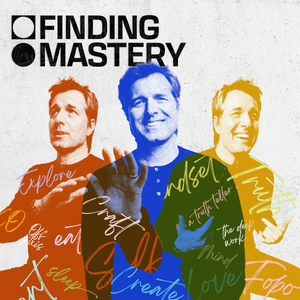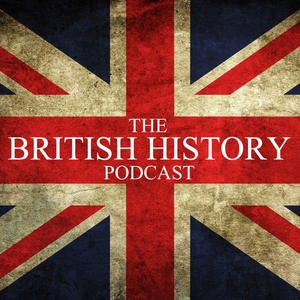
‘Plastic – An Autobiography’ | Allison Cobb discusses facing existential threats
06/15/21 • 18 min
In this episode of Shaping The Future, I speak with the author, Allison Cobb, about her new book titled ‘Plastic - An Autobiography’.
With poetic sensitivity, Allison explores the complexity of how plastic has become part of our lives and how this material, that can endure for generations, has been wilfully categorised as a ‘single use’ disposable product becoming as ubiquitous as food with a highly toxic indigestible after-life.
This autobiography is also personal, linking the horrendous WW2 invasion of Poland with her ancestors who also worked at the Los Alamos National Laboratory on the now infamous Manhattan Project to create the first atomic bomb.
This is a story about complexity, personal journey and the plasticity of all life as we venture forth into the next big existential challenge of preventing climate and ecological collapse.
Thank you for listening to Shaping The Future - there are many more episodes coming so please do subscribe and also consider supporting this work via Patreon.
Timestamps:
1:30 - ‘I wanted to write about the Anthropocene, the geologic scale human impact on the planet, in a way that made it personal’
3:00 Dupont, “See to it that American’s are never satisfied” - consumer capitalism has proliferated across the world.
5:20 - Heidegger’s essay ‘The Thing’ - technology reduces everything to its use-value.
7:30 The baby albatross with ingested plastic is emblematic of the disposable culture.
10:00 Complexity through personal stories that give us hope through empathy.
13:00 How are we doing in terms of the global collective tackling these huge ecological challenges.
15:00 The role of artists and creators along with every human to make the global shift.
Buy on Amazon: https://www.amazon.com/Plastic-Autobiography-Allison-Cobb/dp/164362038X?ref_=nav_custrec_signin&
Visit our main site: https://genn.cc
Back us on Patreon: https://www.patreon.com/genncc
Visit Cambridge Climate Lecture Series Page: https://climateseries.com/climate-change-podcast
In this episode of Shaping The Future, I speak with the author, Allison Cobb, about her new book titled ‘Plastic - An Autobiography’.
With poetic sensitivity, Allison explores the complexity of how plastic has become part of our lives and how this material, that can endure for generations, has been wilfully categorised as a ‘single use’ disposable product becoming as ubiquitous as food with a highly toxic indigestible after-life.
This autobiography is also personal, linking the horrendous WW2 invasion of Poland with her ancestors who also worked at the Los Alamos National Laboratory on the now infamous Manhattan Project to create the first atomic bomb.
This is a story about complexity, personal journey and the plasticity of all life as we venture forth into the next big existential challenge of preventing climate and ecological collapse.
Thank you for listening to Shaping The Future - there are many more episodes coming so please do subscribe and also consider supporting this work via Patreon.
Timestamps:
1:30 - ‘I wanted to write about the Anthropocene, the geologic scale human impact on the planet, in a way that made it personal’
3:00 Dupont, “See to it that American’s are never satisfied” - consumer capitalism has proliferated across the world.
5:20 - Heidegger’s essay ‘The Thing’ - technology reduces everything to its use-value.
7:30 The baby albatross with ingested plastic is emblematic of the disposable culture.
10:00 Complexity through personal stories that give us hope through empathy.
13:00 How are we doing in terms of the global collective tackling these huge ecological challenges.
15:00 The role of artists and creators along with every human to make the global shift.
Buy on Amazon: https://www.amazon.com/Plastic-Autobiography-Allison-Cobb/dp/164362038X?ref_=nav_custrec_signin&
Visit our main site: https://genn.cc
Back us on Patreon: https://www.patreon.com/genncc
Visit Cambridge Climate Lecture Series Page: https://climateseries.com/climate-change-podcast
Previous Episode

Russian Arctic Methane Releases & Subsea Permafrost Degradation | Professor Örjan Gustafsson (Part 2)
In this second episode of the methane miniseries, I speak to Professor Orjan Gustafsson from Stockholm University about his team's ongoing collaboration with the Russian research team, led by Professor Igor Semiletov, investigating the Siberian Arctic.
Orjan has published over 80 research papers jointly with his Russian colleagues on their findings in the Russian Arctic over the course of more than a decade. In this episode, he highlights why understanding this region is among one of the most important research areas in climate change today.
Despite the complexity of geopolitics that often infects peoples thinking in dealing with Russia, the opportunities for scientific collaboration in pursuit of critical knowledge can, in the long run, prove more beneficial than any short term political aims.
Thank you for listening to Shaping The Future. More interviews and podcasts can be found on climateseries.com, GENN.CC and on all major podcast channels and Youtube.
There are many more episodes being recorded. In fact, I am working really hard to turn them all around. Please do subscribe and all feedback is much appreciated.
CONTENTS:
Interview contents by Timestamp[min:sec]|Subject
00:00 Overview of research programme looking at how carbon feedback processes work.
03:50 Degradation of subsea permafrost.
07:00 Different sources of methane.
09:00 Subsea permafrost not a risk?
11:30 Quantity of thermogenic methane.
13:30 Why this matters for policy.
14:40 Defining megaseeps.
17:00 Extrapolating estimates of megaseeps.
18:38 Is there a known countervailing force?
20:30 Is policy and rate of research in the area sufficient?
21:00 Is the Russian Presidency of the Arctic Council good for research?
21:50 Why what is happening in Siberia should be considered top scientific priority.
23:45 Slope hydrate vulnerability due to Atlantification of Arctic (warm inflow of water).
26:35 Russian Presidency a good opportunity for collaboration.
26:58 Research to be published in 2021.
27:38 New open access database live - CircumArctic Shelf Carbon database, “CASCADE”.
30:45 Science as diplomacy.
Support on Patreon: https://patreon.com/genncc
Visit & subscribe to genn.cc: https://genn.cc
Next Episode

Ecosia Search Engine Founder/CEO, Christian Kroll | Turning profits into trees
In this episode of Shaping The Future. Am speaking with Christian Kroll, founder, and CEO of Ecosia, the world’s largest not-for-profit search engine that actually uses profits to plant trees.
Christian has built a true 21st-century enterprise that sees profit in terms of how much carbon they can lock up while respecting privacy and paying taxes.
To paraphrase Christian: no one should be able to call themselves a billionaire until they absorb a billion tonnes of carbon from the atmosphere.
Every Ad clicked on the Ecosia search engine means that trees get planted that support communities and the environment.
It is a simple choice that all of us can make, to switch a daily activity, like web searching, to actually having a positive impact on the climate.
Christian also talks about a growing generation of green technology innovators who are doing things differently.
Forget the usual billionaires with macho space toys and start listening to the next generation who are focused on repairing the Earth and shaping a world that is actually better for all of us.
Support this channel: https://www.patreon.com/genncc - visit our main site: https://genn.cc
Time Stamps:
1.45 – Big versus small, Google versus Ecosia, on the eco-scale
3.30 – More users can help drive Ecosia to plant 1 trillion trees
4.30 – Tech companies have a role to play in becoming fully regenerative in terms of repairing climate – carbon neutrality was for the 1980’s!
6.30 – inspiring young people going into the workplace to be part of the transformation of society
9.05 – Tech billionaires look ridiculous in this current age. ‘If you are in the 21st Century, I think you should only be allowed to call yourself a billionaire if you have actually absorbed a billion tonnes of CO2 from the atmosphere!’
9.45 – Young entrepreneurs starting businesses that centralise the climate impact
11.55 – Overall we need to switch from focus on profit to what is important for our wellbeing and happiness – what is the new GDP that we should aim for?
14:40 – Sticking to search tools, protecting privacy and planting trees
16.00 – 80% of users under 30 and engage with Ecosia stories via social media like Instagram/Youtube
17.00 – Message to young innovators: “If people say change is hard, we have to think about what will happen if we don’t change... young people have understood [climate change]... and that is a good thing!”
20.00 – Sharing the knowledge by speaking to large corporations or any entity where change can happen on a meaningful scale. We have to do this fast or we fail.
If you like this episode you’ll love
Episode Comments
Generate a badge
Get a badge for your website that links back to this episode
<a href="https://goodpods.com/podcasts/climategenn-hosted-by-nick-breeze-117987/plastic-an-autobiography-allison-cobb-discusses-facing-existential-thr-14699285"> <img src="https://storage.googleapis.com/goodpods-images-bucket/badges/generic-badge-1.svg" alt="listen to ‘plastic – an autobiography’ | allison cobb discusses facing existential threats on goodpods" style="width: 225px" /> </a>
Copy




